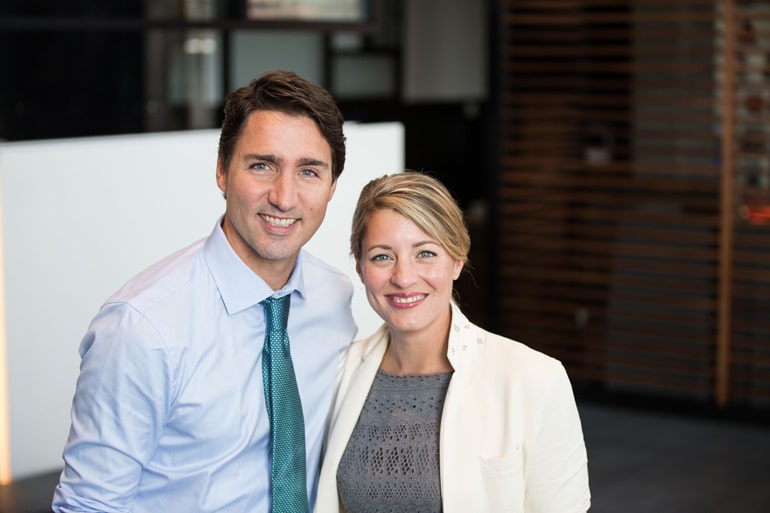Justin Trudeau blows his budget on arts
mainThe Canadian prime minister has promised an extra C$675 million over five years to the state broadcaster CBC, and a further C$550-million to the Canada Council for distribution to the arts.
Medici government is back.






The Canada Council for the Arts doesn’t need more money. It needs a serious overhaul of how it functions. Right now it is nothing but an old boy’s club of mutual back scratching. Most of the grants and subsidies have completely unrealistic and subjective requirements attached to them. Unless you know someone on the jury, you’re out of luck.
That has not been true in my experience. I have received two long term grants from the Canada Council to study in Germany, and both times I applied I didn’t know anyone on the jury. “Grant”ed, I have only applied for funding for individual music study projects, but I have never felt there were unrealistic demands or an unreasonable application process.
Agreed. A hugely disproportionate amount of Canada Council funding gushes into Quebec (especially) and Ontario. It’s there for all to see on the Canada Council website – hundreds and hundreds of thousands of dollars enthusiastically rubber-stamped to la belle province by juries drowning in their own conflict of interest. The Maritime and western provinces, meanwhile, get a few thousand dollars each in table scraps. It’s impossible to take the Canada Council seriously except as a siphon of tax dollars for the benefit of colleagues, students and sycophants of jury members. Political correctness dictates juries are bilingual, and so they’re perpetually tilted irresistibly towards French Canada. What an expensive joke.
I’m sorry, but this is simply nonsense. I have had numerous occasions to sit on juries of the Canada Council, and I can tell you that the jury process is eminently fair and based on a thorough review of each application and its strengths and weaknesses. Contrary to what is stated here, there is no obligation for jury members to be bilingual. The implication that you need to know someone on the jury to have any luck is simply not true. Jury memberships are kept confidential until the assessment process is completed, and I have never known a jury composition to be anything other than entirely representative of each region.
You write based on your experience sitting on juries at CCA, and I write based on mine. I won’t reciprocate and call your impressions nonsense. I think you’re naive though. The grants given to artists and organizations are there for all to see on the CCA website. Quebec grants are so ridiculously bloated – about which you remain tellingly silent while you defend the honor of juries – that it’s not possible to ignore or explain, unless malfeasance and favouritism raise their ugly heads.
One other thing: You and your fellow jurists were asked at the start whether deliberations should be conducted in English or French, correct? Implying a bilingual jury (and not necessarily bilingual jurists), no? And you ended up discussing everything in English, right? So even if you personally aren’t bilingual, the French speaking jurists were and accommodated, yes? So you’re correct (jurists don’t need to be bilingual) and I’m correct (juries need to be bilingual). You argued a point I didn’t make.
The increase in federal arts funding is a positive development, but the funding will not “blow” the budget. During the same period, $8.4 Billion will be spent on social services to aboriginal people, and about $60 Billion will be spent on federal infrastructure.
Mr. Lebrecht appears to think Canada operates on a budget of $1 billion per annum. Whereas it is a G-7 country.
That said, we are pleased to see the money — whatever the sum, it is the first indication of support for the arts, let alone the CBC, in over a decade. Maybe getting an ex-drama teacher for PM was not such a bad idea!
The federal arts funding will not “blow” the total funding of the national budget, period. At the same time corporations ask for and receive tax expenditures that reduces their corporate taxes owing and known as social welfare. There are literally more than a hundred corporations in Canada that pay ZERO taxes to the feds. The federal department of finance publishes the list regularly. every several years.
I’m wondering what a 40 year old knows about federal budgeting and real politik at all, to be honest. When all western countries are drowning in debt and deficit he seems to be spending like a drunken sailor; I say ‘seems’ because I don’t really know how much debt Canada carries. But if it’s like the rest of the world it’s pretty darn dreadful.
The projected budget deficit is -6.9% of revenue. By comparison, the average deficit for the past 50 years was -13.9%.
The worst period was ’84-’85, when the deficit peaked at -51.6%.
The Prime Minister does not produce the budget by himself. The Finance Minister’s office does most of the work.
Noted.
With interest rates at all time lows and a sputtering economy in need of a kick start, it would really be quite foolish for Trudeau to copy UK-style austerity. He ran on a platform to run budget deficits and kudos to Canadians for rejecting BS neo-con “economics”.
You could sum up this post with: I don’t know any of the facts, and I can’t be bothered to look them up, and I don’t know much about economics, either. But that’s not going to stop me commenting.
There is nothing wrong with a nation carrying debt. Far better that a nation carries debt, than its populace. And public debt incurred in the investment of a nation’s future almost always returns its investment and a profit to boot. And, yes, that includes the Arts. It’s no accident that the Arts Council was the creation of John Maynard Keynes.
Except that private and public debt are now at historic levels of unsustainability. Think of a household; if you cannot pay your debts how long before the bank forecloses? This is no different to an economy. And leveraging the future only burdens the next generation with back-breaking debt. But many people don’t seem to care about that.
As to Keynes; there’s a lot of argument about his thinking. Read Niall Ferguson. The issue isn’t just one of economics, but of social institutions and the culture more generally. Possibly the greatest chimera is the notion that growth will continue. We are now at the pointy end of stagnation yet governments spend as though there was still growth.
This is my answer; everybody has to work a WHOLE LOT HARDER. And for less.
The arts in Canada play a key role in GDP, employment, cultural relations, and hopefully now the reconciliation process with our First Nations peoples – this commitment to the arts shows faith in the arts as an essential part of society. Canada council and the CBC both need overhauling, here’s hoping the leadership is held to task.
Both the CBC (as it regards classical music programming) and the Banff Centre have been essentially dismantled from decades of development and growth. And I am not just talking about the Harper years. The dismantling began long before him. Keep in mind, you can easily take things down, but to re-grow? It takes the same amount of time…decades. Trudeau will most likely be a memory at the time more is needed.
Good! The CBC needs it. Money for more vice presidents, cocktail parties and trips to conventions. I wonder if they would consider reinstating the Vancouver Radio Orchestra. Probably no money for that.
Or for their dismantled drama department. The news reports I read mentioned the money was for developing digital capacity and aboriginal programming. While the latter is worthy, it is a small population, and one in need of far more essential services than native arts centres — and for which it is getting a much more substantial chunk of change than the arts.
Watch the Canada Council for their commitment to aboriginal arts.
Aboriginal programming is not just for Indigenous people, if that’s what you imply. Indigenous voices in broadcasting are underrepresented, and I think that’s what this money is aimed at counteracting. It’s true that Aboriginal communities need clean drinking water, education, health care, etc., but that’s no reason to hold off on making sure their voices are heard on the CBC.
Here’s one to celebrate. I can’t believe the backbiting above. Maybe things are wrong in detail but the general statement should be greeted with joy and flagged up as an example to us here. Why is Canada the only big country where things are going right at the moment? Sure it has a lot to do with the ministers in Trudeau’s cabinet who know whereof they speak (doctors, teachers etc). What a miserable contrast to Hunt, Wittingdale et al.